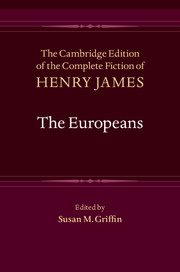Book contents
- Frontmatter
- Contents
- List of Illustrations
- Acknowledgements
- List of Abbreviations
- General Editors’ Preface
- General Chronology of James’s Life and Writings
- Introduction
- Textual Introduction
- Chronology of Composition and Production
- Bibliography
- The Europeans
- Glossary of Foreign Words and Phrases
- Notes
- Textual Variants
- Emendations
Chapter 3
Published online by Cambridge University Press: 11 April 2021
- Frontmatter
- Contents
- List of Illustrations
- Acknowledgements
- List of Abbreviations
- General Editors’ Preface
- General Chronology of James’s Life and Writings
- Introduction
- Textual Introduction
- Chronology of Composition and Production
- Bibliography
- The Europeans
- Glossary of Foreign Words and Phrases
- Notes
- Textual Variants
- Emendations
Summary
IT seemed to Robert Acton, after Eugenia had come to his house, that something had passed between them which made them a good deal more intimate. It was hard to say exactly what, except her telling him that she had taken her resolution with regard to the Prince Adolf; for Madame Münster's visit had made no difference in their relations. He came to see her very often; but he had come to see her very often before. It was agreeable to him to find himself in her little drawing-room; but this was not a new discovery. There was a change, however, in this sense: that if the Baroness had been a great deal in Acton's thoughts before, she was now never out of them. From the first she had been personally fascinating; but the fascination now had become intellectual as well. He was constantly pondering her words and motions; they were as interesting as the factors in an algebraic problem. This is saying a good deal; for Acton was extremely fond of mathematics. He asked himself whether it could be that he was in love with her, and then hoped he was not; hoped it not so much for his own sake as for that of the amatory passion itself. If this was love, love had been over-rated. Love was a poetic impulse, and his own state of feeling with regard to the Baroness was largely characterized by that eminently prosaic sentiment—curiosity. It was true, as Acton with his quietly cogitative habit observed to himself, that curiosity, pushed to a given point, might become a romantic passion; and he certainly thought enough about this charming woman to make him restless and even a little melancholy. It puzzled and vexed him at times to feel that he was not more ardent. He was not in the least bent upon remaining a bachelor. In his younger years he had been—or he had tried to be—of the opinion that it would be a good deal “jollier” not to marry, and he had flattered himself that his single condition was something of a citadel. It was a citadel, at all events, of which he had long since levelled the outworks. He had removed the guns from the ramparts; he had lowered the draw-bridge across the moat.
- Type
- Chapter
- Information
- The Europeans , pp. 100 - 112Publisher: Cambridge University PressPrint publication year: 2015



